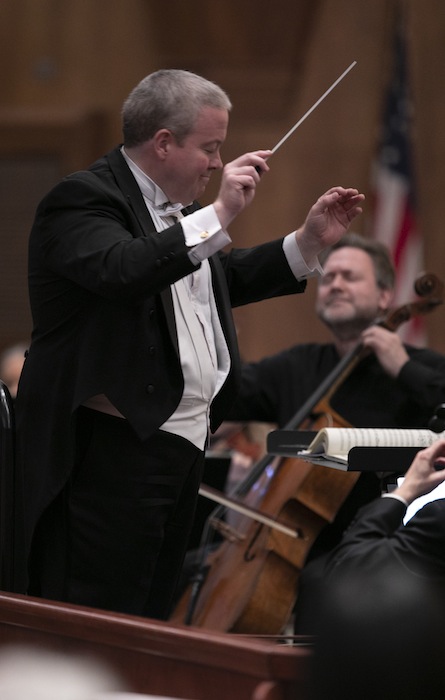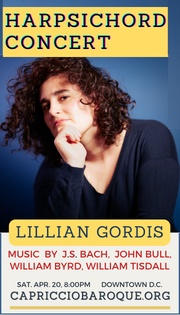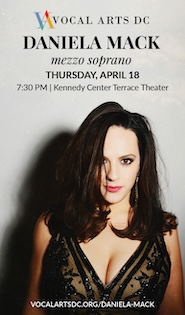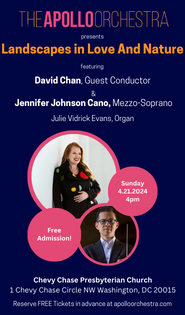Apollo Orchestra brings vocal Strauss and Tchaikovsky symphony to a new audience

Stephen Czarkowski conducted the Apollo Orchestra at the Church of the Epiphany Saturday night. File photo: Bruce V. Boyajian
The Apollo Orchestra, which already performs all over Northwest DC and some close-in suburbs inaugurated a new venue for its concerts on Saturday night. The Church of the Epiphany may place the orchestra almost in the laps of the audience but its central location and convenient access to public transportation satisfies Apollo’s mission to bring symphonic music into the neighborhoods. And, thanks to the generosity of the Downing Family Foundation, the concerts are free.
It may seem churlish, therefore, to mention that smallish churches provide terrible acoustic settings for a medium-size symphony orchestra playing with enthusiasm. Putting that caveat aside, Saturday’s program of vocal music by Richard Strauss and Tchaikovsky’s final symphony had some splendid moments.
The all-Strauss first half featured songs and vocal ensembles from the operas Arabella and Der Rosenkavalier. Soprano Jennifer Casey Cabot and mezzo-soprano Hannah Hagerty (a participant in the Washington National Opera’s Domingo-Cafritz Young Artist Program) offered a smoldering performance of the opening scene from Der Rosenkavalier. Cabot has the kind of rich comforting voice that a mature, aristocratic woman of the world like the Marschallin ought to have and Hagerty in the trouser role of her young lover, Octavian, sang with youthful power and clarity. Neither had any trouble projecting over the orchestra.
For its part, the orchestral horns were majestic in the fanfare-like opening of the Der Rosenkavalier Overture which conductor Stephen Czarkowski led with a compelling sense of movement. Oddly, the concert didn’t begin with this obvious curtain-opener, but with a sweet but rather static duet from Arabella in which Cabot as Arabella and soprano Alexandra Nowakowski as Arabella’s sister, Zdenka, muse about their visions of love, pro and con.
Nowakowski, also a Domingo-Cafritz Young Artist Program participant, sang with admirable accuracy and with a light voice that, in her lower range disappeared into the orchestra. All three of the evening’s singers used scores but Nowakowski seemed to have the most difficulty freeing herself enough from the printed page to immerse herself into her roles. That same score- dependence also seemed to bind her from the freedom needed to spin out a convincing sense of wonder and tenderness in two Strauss songs from Op. 48, “Freundliche Vision” and “Winterweihe.”
After intermission, Czarkowski led a reading of Tchaikovsky’s Symphony No. 6 that was coherent and vivid in its outline and pacing but frequently imprecise in its interior details.
The winds were strong; the violas, particularly in the first movement, were dark and rich and, in the romantic melodies of the first and last movement, the strings sang in long, beautifully shaped lines.
But there was a tendency in the martial third movement to anticipate the powerfully rhythmic beat and, throughout, a lot of fast string scurrying around that never quite came together. The small venue’s acoustic muddied things enough so that this ensemble breakdown wasn’t a deal breaker but these are good players who have showed that they can do better.
Cellist Amit Peled performs with the Apollo Orchestra 6 p.m. March 10 at the Kennedy Center’s Terrace Theater. apolloorchestra.com








Posted Feb 27, 2019 at 7:41 pm by Joyce
Harsh.